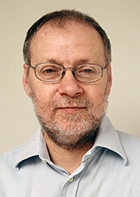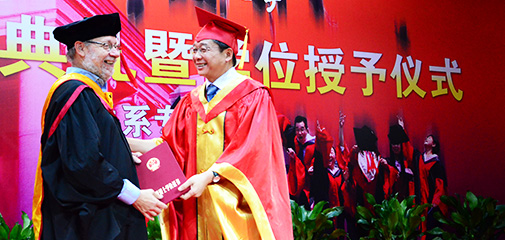Obituary: Professor Uffe Haagerup
Uffe Haagerup passed away Sunday, July 5, 2015, in a tragic drowning accident close to his summer house at Faaborg on Funen. Denmark and the whole world have lost a uniquely gifted mathematician, a warm and friendly person, and a beloved father.

Uffe Haagerup was Professor at the Department of Mathematical Sciences at the University of Copenhagen during January 1, 2010 – December 31, 2014, while he held an advanced ERC grant.
Uffe was born December 19, 1949, in the town of Kolding, but grew up in Faaborg, being the younger of two brothers. Uffe found much inspiration in his older brother Jens (who also became a mathematician). At the age of 10, Uffe started helping the local surveyor measuring land and solved difficult trigonometric problems in the process, thus founding his life-long interest in maps and atlases. Uffe graduated from high school in Svendborg on Funen in 1968.
The same year Uffe enrolled in the physics and mathematics program at the University of Copenhagen. Being fascinated with the theory of general relativity and quantum mechanics, he first chose to continue with physics at graduate level. Later, being exposed to operator algebras and the Tomita-Takesaki theory in various seminars, he switched to mathematics and wrote his Masters thesis with Gert Kjærgaard Pedersen.
In his Masters thesis Uffe proved a new remarkable result related to the Tomita-Takesaki theory (the self-dual cone) which resulted in his first paper entitled “The standard form of von Neumann algebras”, to the day one of his most cited papers! This paper gave Uffe instant international fame and recognition. It also landed him his first job in 1974, namely a tenure track position at the recently opened Department of Mathematics at Odense University. Curiously, Uffe never got – and never needed – a PhD degree in mathematics. In 1981, at the age of 31, he became professor at Odense University making him the youngest professor in the country. In 2010-2014, he was appointed Professor at the University of Copenhagen. In 2015 he returned to Odense to resume his professorship at the University of Southern Denmark.
Throughout his career, Uffe had several offers from prestigious universities mostly in North America, but chose to stay in Denmark. He spent several sabbaticals abroad including stays at UCLA, MSRI at Berkelely, University of Munster (where he held a Humboldt fellowship), University of Toronto and the Fields Institute, and the Mittag-Leffler Institute in Stockholm, where he organized a year for operator algebras in 1988/89. This illustrates how Uffe was a very international person, while at the same time very tied to Denmark – and mostly to Funen, his home island. The name Haagerup has achieved inter-national acclaim, but it is only the Danes that really know how to pronounce it!
Uffe’s Masters thesis was the beginning of a flourishing stream of remarkable and wonderful theorems from his hand. The highlight may be considered to be his solution in 1984 of Connes’ (in)famous bicentralizer problem, also called the “Champagne problem” (published in Acta Mathematica, 1987). From Uffe’s positive solution of this problem it follows that there is only one hyperfinite type III_1-factor. This completed the classification of the hyperfinite von Neumann factors, a program initiated by Murray and von Neumann in the 1930’s and almost brought to a completion by the work of Connes in the 1970’s, with “only” the type III_1 case left open. This remarkable achievement lifted Uffe from being an internationally well-known mathematician to becoming an indisputable world leader in his field.
It is not easy to select which other theorems of Uffe should be mentioned here. Each mathematician has his or her own favorites. His paper on an example of a non-nuclear C*-algebra with the metric approximation property (Inventiones Math., 1978) is, in many ways, characteristic of Uffe’s research. He sets out to solve the hard analytic problem whether the metric and the completely positive approximation properties are the same. He proves that they are not, and along the way discovers a new property of a group – now called the Haagerup property. This property, which has become an important notion in analytic group theory, still generates a lot of interesting research; as witnessed for example by the fairly recent textbook by Cherix, Cowling, Jolissaint, Julg and Valette with the title “Groups with the Haagerup Property: Gromov’s a-T-menability”. Other important contributions of Uffe include his characterization of nuclear C*-algebras (Inventiones, 1983), his proof that quasitraces on exact C*-algebras are traces (handwritten notes from 1991 typed up 22 years later!), his seminal work on random matrices (Annals Math, 2005) joint with Thorbjørnsen, and his construction of new irreducible subfactors of small index > 4, to mention only a few.
Uffe received many honors during his career (other than the bottle of champagne from Alain Connes for his solution of the “Champagne problem”!). He gave an invited talk at the ICM in Berkeley in 1984 and a plenary address at ICM in Beijing in 2002. He was awarded the Friedman prize in 1985 at UCLA, the Danish Ole Rømer Award in 1989, and the Latsis prize from the European Science Foundation in 2012. He was editor-in-chief of Acta Mathematica 2000-2006.

In 2013 he could finally call himself a doctor when he was given an honorary doctoral title from East China Normal University. He held an advanced ERC grant 2010-2014.
Uffe Haagerup was a popular PhD and Master thesis advisor, and had several students during his 5 years in Copenhagen and of course also many students during his many years in Odense. He will be deeply missed by his two sons, Søren and Peter, his family, his friends, his students, and his many colleagues in Denmark and abroad. Uffe will be remembered for his kind personality and his magical mathematical skills, which he generously shared with his many collaborators.
Mikael Rørdam & Magdalena Musat
